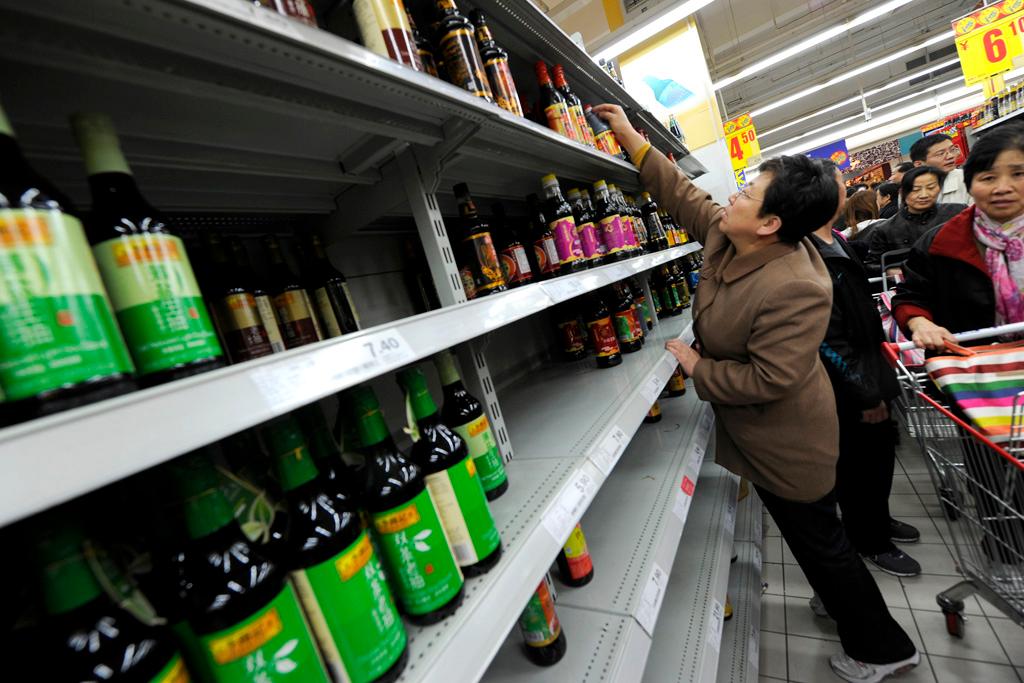Japan nuclear fears spread to China
A woman stretches to get a bottle of soy sauce on the shelf after salt sold out early at a supermarket in Beijing on March 17, 2011.
BEIJING, China – By mid-afternoon Thursday, Fang Zhiming had already rummaged through three supermarkets in the Chinese capital searching for salt. She found none, but was on her way to a fourth shop, where her friend assured her salt remained.
"We already have a large bag at home for cooking, but I want to get as much as possible just in case it runs out,” said Fang, a 34-year-old office worker who went salt shopping on her lunch break.
Fang was one in a sea of Chinese citizens scouring the country’s stores for salt, in the wake of the catastrophic earthquake and tsunami in Japan. Fears of a nuclear meltdown and radiation contamination continue, and China’s population proved it was not immune to potentially irrational panic. Salt in China typically contains small amounts of iodine, added to prevent thyroid and related health problems, particularly in children.
Some shoppers apparently were after the iodine, mistakenly seeking protection against potential radioactive fallout from Japan. Even though scientists say prevailing wind patterns should carry contamination from failed nuclear plants out to sea, away from China, people don’t want to be caught unprepared. Yet the small amount of iodine in table salt is nowhere near what’s recommended for exposure to radiation, making it virtually impossible to use iodized salt as a prophylactic. It would take more than two pounds of salt to equal the iodine in one tablet.
Even the popular e-commerce platform Taobao was short of salt. In a posting, the company said it was working to manage salt supplies but couldn’t keep up, echoing stores across the country.
But not all salt-buyers were looking for radiation protection. Instead, there seemed to be a more prevalent fear that cooking supplies would run out amid hoarding. As a result, soy sauce was also in short supply, several shops reported.
The manager of a supermarket in Nanjing, who didn’t want to give his full name, said by telephone that he believed the salt splurge was driven by greedy forces, rather than real panic.
“Don’t worry about this; salt is a common product,” he said. “The current situation is manipulated by a few people and there will be salt soon.”
Reason seemed absent, however, as prices rose and salt sailed off the shelves. Many stores ran out, while others raised prices and rationed supplies. In an initial attempt to calm the salt rush, the Xinhua news agency weighed in with a one-line statement from the government Thursday afternoon, saying: “[The] China National Salt Industry Corp. (CNSIC) on Thursday said China has rich salt reserves to meet people's demand and consumers need not panic to hoard salt.”
Meanwhile, China’s state-run radio was reporting that salt was not a protective measure against radiation.
On Wednesday, the Ministry of Environment published radiation readings in 41 cities across China, showing that all were within allowed limits. But given past coverups and limited information in state-controlled media, Chinese people don’t always trust the official line in a crisis.
A day earlier, the government’s main ruling cabinet, the State Council, announced that it would suspend approvals and construction of new nuclear power facilities to conduct a safety review.
That changed the official line from over the weekend, when a senior official said China would not changed or delay its current plans to build more than two dozen new nuclear plants in the coming years, as part of a drive to reduce carbon emissions from coal burning. The country now has six operating nuclear plants, but has plans to scale that up dramatically.
“Safety is our top priority in developing nuclear power plants,” the State Council said in brief notice on its website.
Less than six months ago, the head of China’s nuclear energy program was sentenced to life in prison for taking bribes and abusing his authority. Rampant graft in the building industry, leading to use of subpar materials, has been cited as one cause of the high death toll in the Sichuan province earthquake of 2008, when nearly 90,000 people were killed.
Every day, reporters and producers at The World are hard at work bringing you human-centered news from across the globe. But we can’t do it without you. We need your support to ensure we can continue this work for another year.
Make a gift today, and you’ll help us unlock a matching gift of $67,000!
